Al-Kateb v Godwin Case Study: Constitutional Law and Immigration Law
VerifiedAdded on 2020/07/22
|8
|2476
|42
Case Study
AI Summary
This case study examines the landmark case of Al-Kateb v. Godwin, which revolves around constitutional law, immigration, and the concept of indefinite detention under the Migration Act 1958. The case involves Al-Kateb, a stateless person seeking to remain in Australia, whose visa application was rejected, leading to his indefinite detention. The analysis explores the legal principles of constitutional law, the separation of powers, and the judicial review process. The study highlights the implications of the Migration Act, particularly sections concerning detention and removal of non-citizens, and the challenges faced by stateless individuals. Key aspects include the rejection of visa applications, the legal arguments presented, and the court's final judgment, including the application of habeas corpus. The case underscores the importance of understanding the legal framework surrounding immigration, detention, and the rights of individuals within a constitutional context. This case study offers valuable insights into the complexities of immigration law and the balance between national security and individual liberties.
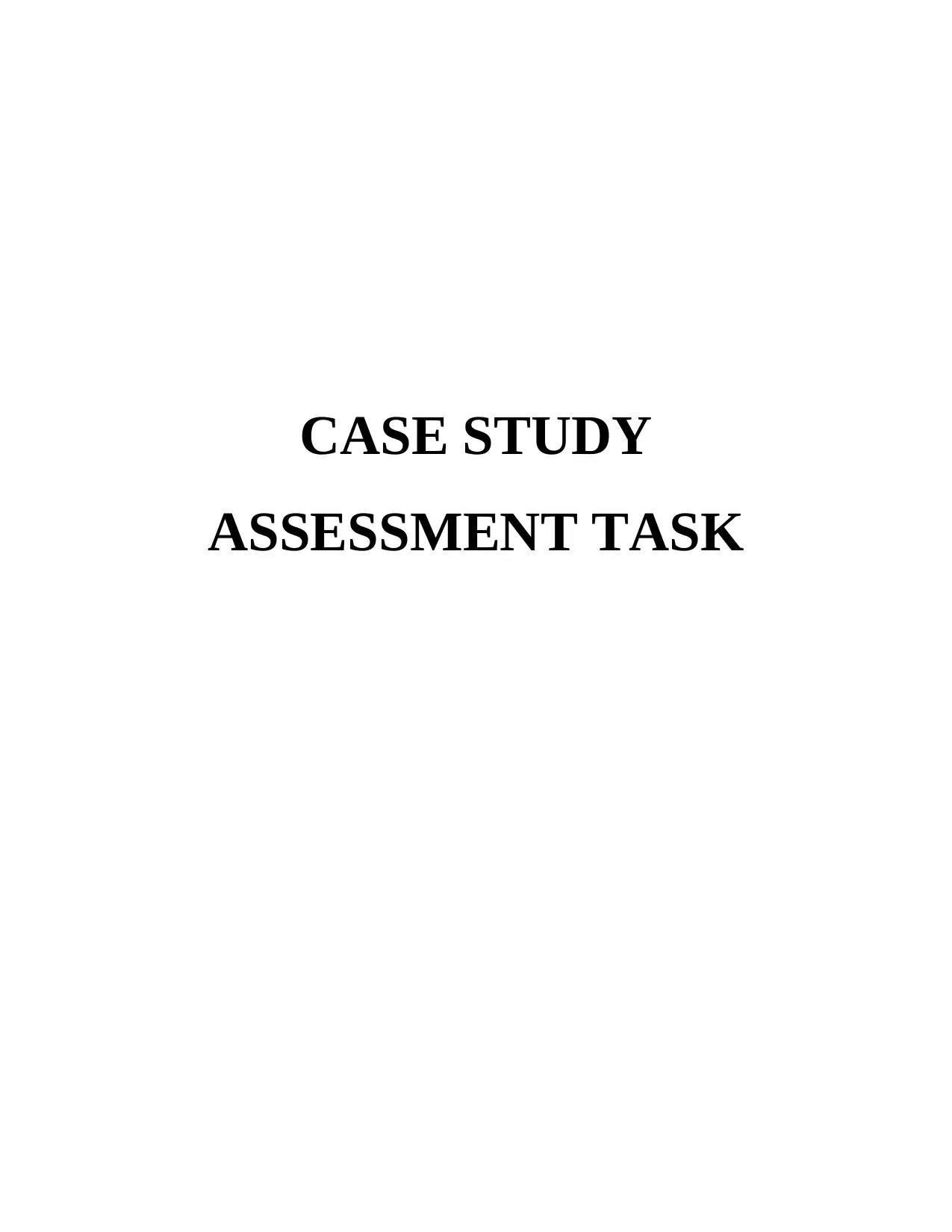
CASE STUDY
ASSESSMENT TASK
ASSESSMENT TASK
Paraphrase This Document
Need a fresh take? Get an instant paraphrase of this document with our AI Paraphraser
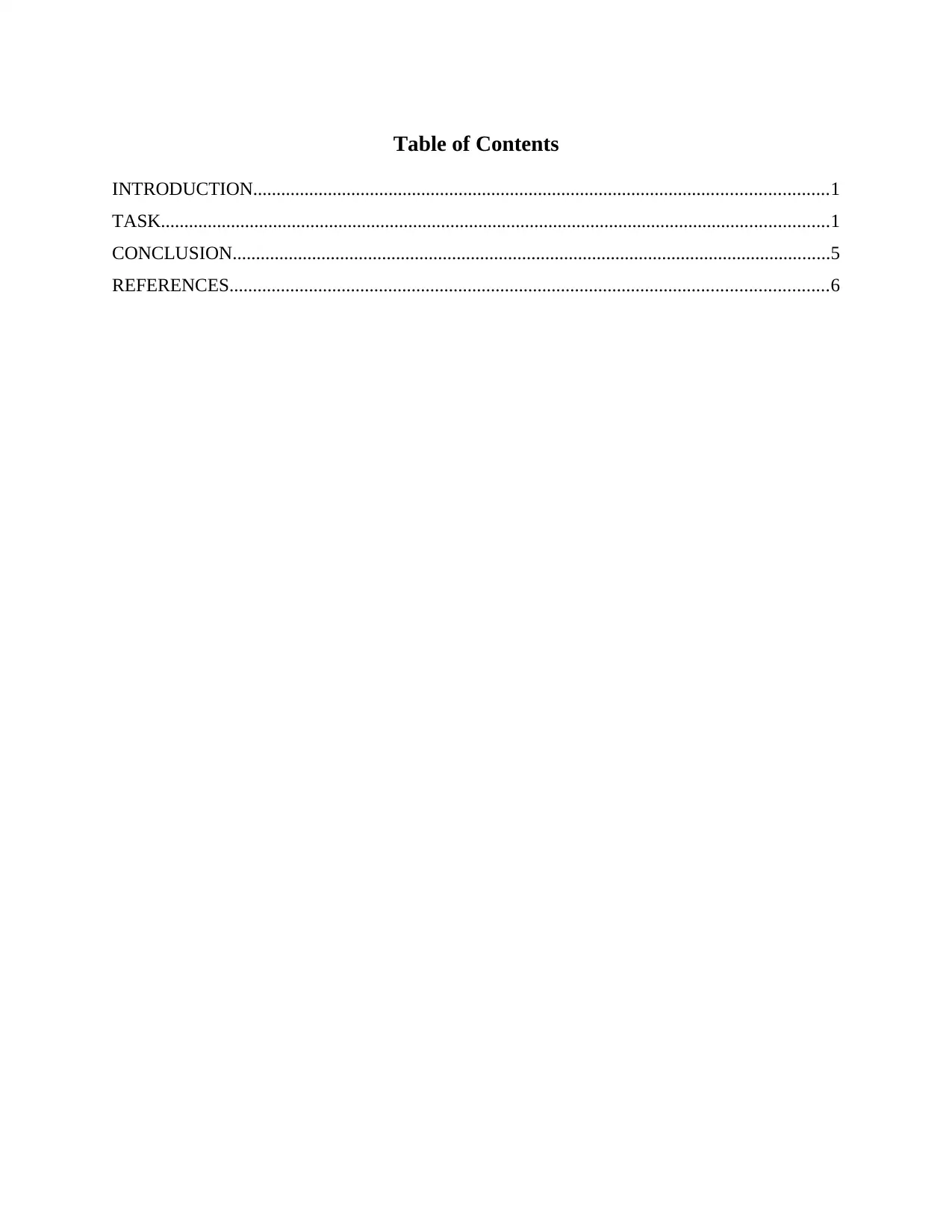
Table of Contents
INTRODUCTION...........................................................................................................................1
TASK...............................................................................................................................................1
CONCLUSION................................................................................................................................5
REFERENCES................................................................................................................................6
INTRODUCTION...........................................................................................................................1
TASK...............................................................................................................................................1
CONCLUSION................................................................................................................................5
REFERENCES................................................................................................................................6
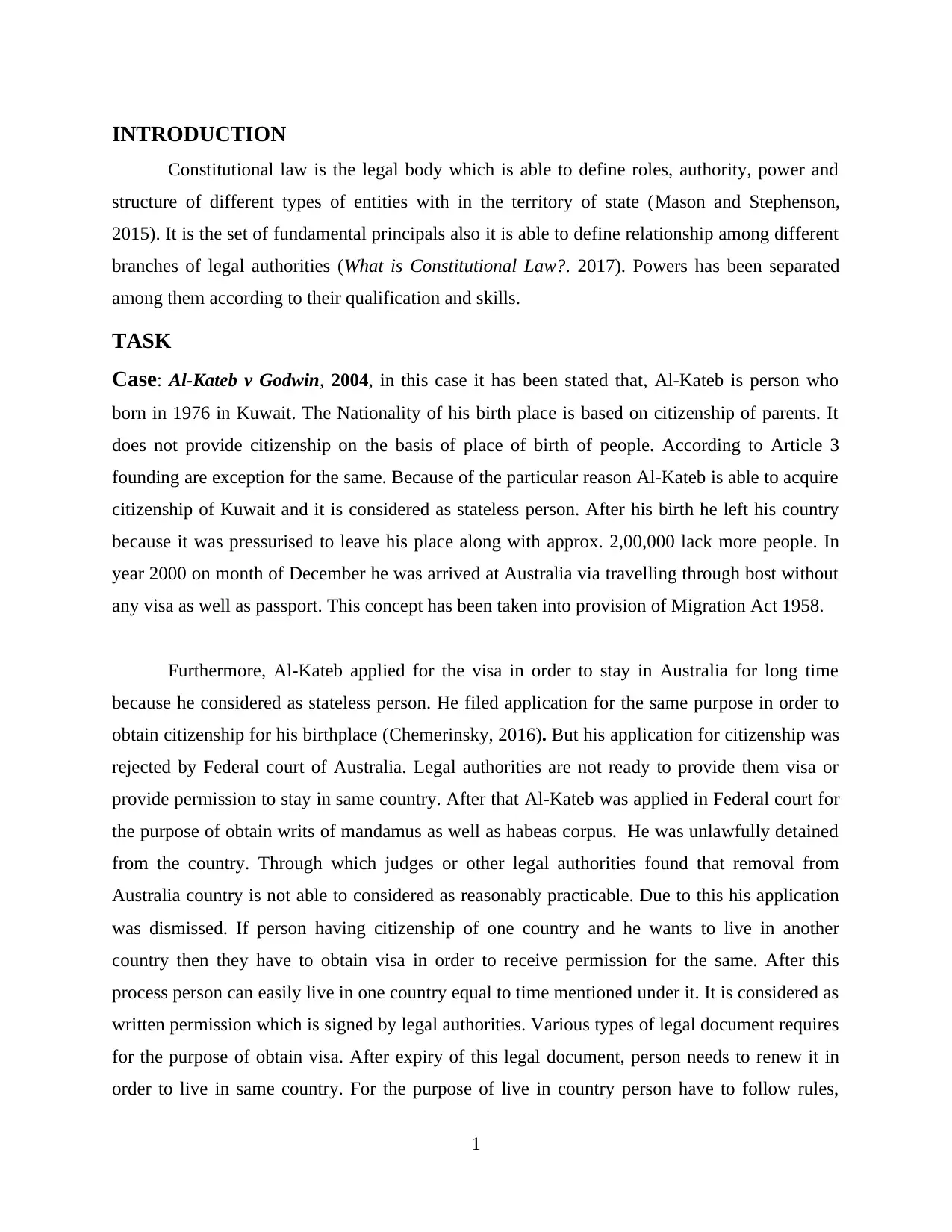
INTRODUCTION
Constitutional law is the legal body which is able to define roles, authority, power and
structure of different types of entities with in the territory of state (Mason and Stephenson,
2015). It is the set of fundamental principals also it is able to define relationship among different
branches of legal authorities (What is Constitutional Law?. 2017). Powers has been separated
among them according to their qualification and skills.
TASK
Case: Al-Kateb v Godwin, 2004, in this case it has been stated that, Al-Kateb is person who
born in 1976 in Kuwait. The Nationality of his birth place is based on citizenship of parents. It
does not provide citizenship on the basis of place of birth of people. According to Article 3
founding are exception for the same. Because of the particular reason Al-Kateb is able to acquire
citizenship of Kuwait and it is considered as stateless person. After his birth he left his country
because it was pressurised to leave his place along with approx. 2,00,000 lack more people. In
year 2000 on month of December he was arrived at Australia via travelling through bost without
any visa as well as passport. This concept has been taken into provision of Migration Act 1958.
Furthermore, Al-Kateb applied for the visa in order to stay in Australia for long time
because he considered as stateless person. He filed application for the same purpose in order to
obtain citizenship for his birthplace (Chemerinsky, 2016). But his application for citizenship was
rejected by Federal court of Australia. Legal authorities are not ready to provide them visa or
provide permission to stay in same country. After that Al-Kateb was applied in Federal court for
the purpose of obtain writs of mandamus as well as habeas corpus. He was unlawfully detained
from the country. Through which judges or other legal authorities found that removal from
Australia country is not able to considered as reasonably practicable. Due to this his application
was dismissed. If person having citizenship of one country and he wants to live in another
country then they have to obtain visa in order to receive permission for the same. After this
process person can easily live in one country equal to time mentioned under it. It is considered as
written permission which is signed by legal authorities. Various types of legal document requires
for the purpose of obtain visa. After expiry of this legal document, person needs to renew it in
order to live in same country. For the purpose of live in country person have to follow rules,
1
Constitutional law is the legal body which is able to define roles, authority, power and
structure of different types of entities with in the territory of state (Mason and Stephenson,
2015). It is the set of fundamental principals also it is able to define relationship among different
branches of legal authorities (What is Constitutional Law?. 2017). Powers has been separated
among them according to their qualification and skills.
TASK
Case: Al-Kateb v Godwin, 2004, in this case it has been stated that, Al-Kateb is person who
born in 1976 in Kuwait. The Nationality of his birth place is based on citizenship of parents. It
does not provide citizenship on the basis of place of birth of people. According to Article 3
founding are exception for the same. Because of the particular reason Al-Kateb is able to acquire
citizenship of Kuwait and it is considered as stateless person. After his birth he left his country
because it was pressurised to leave his place along with approx. 2,00,000 lack more people. In
year 2000 on month of December he was arrived at Australia via travelling through bost without
any visa as well as passport. This concept has been taken into provision of Migration Act 1958.
Furthermore, Al-Kateb applied for the visa in order to stay in Australia for long time
because he considered as stateless person. He filed application for the same purpose in order to
obtain citizenship for his birthplace (Chemerinsky, 2016). But his application for citizenship was
rejected by Federal court of Australia. Legal authorities are not ready to provide them visa or
provide permission to stay in same country. After that Al-Kateb was applied in Federal court for
the purpose of obtain writs of mandamus as well as habeas corpus. He was unlawfully detained
from the country. Through which judges or other legal authorities found that removal from
Australia country is not able to considered as reasonably practicable. Due to this his application
was dismissed. If person having citizenship of one country and he wants to live in another
country then they have to obtain visa in order to receive permission for the same. After this
process person can easily live in one country equal to time mentioned under it. It is considered as
written permission which is signed by legal authorities. Various types of legal document requires
for the purpose of obtain visa. After expiry of this legal document, person needs to renew it in
order to live in same country. For the purpose of live in country person have to follow rules,
1
⊘ This is a preview!⊘
Do you want full access?
Subscribe today to unlock all pages.

Trusted by 1+ million students worldwide
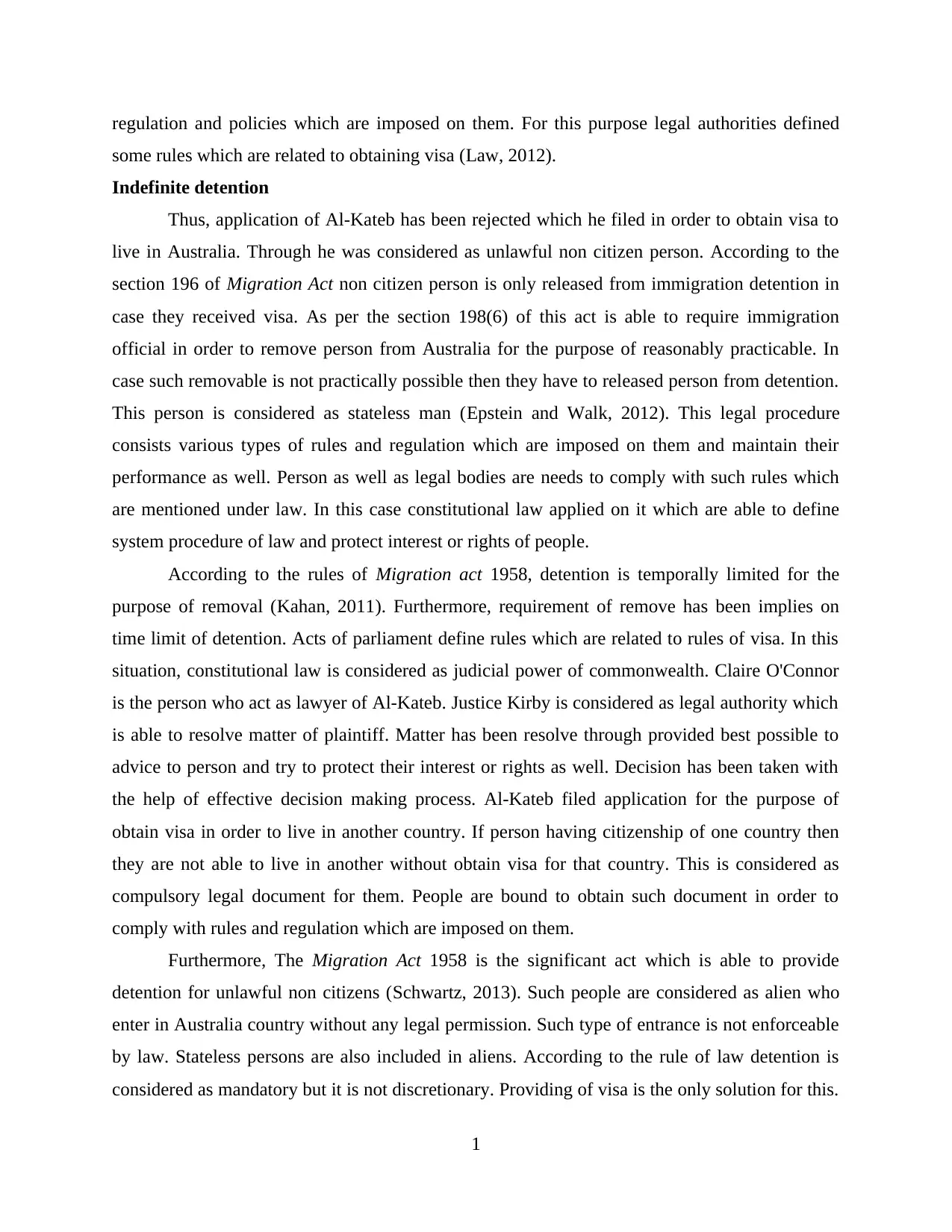
regulation and policies which are imposed on them. For this purpose legal authorities defined
some rules which are related to obtaining visa (Law, 2012).
Indefinite detention
Thus, application of Al-Kateb has been rejected which he filed in order to obtain visa to
live in Australia. Through he was considered as unlawful non citizen person. According to the
section 196 of Migration Act non citizen person is only released from immigration detention in
case they received visa. As per the section 198(6) of this act is able to require immigration
official in order to remove person from Australia for the purpose of reasonably practicable. In
case such removable is not practically possible then they have to released person from detention.
This person is considered as stateless man (Epstein and Walk, 2012). This legal procedure
consists various types of rules and regulation which are imposed on them and maintain their
performance as well. Person as well as legal bodies are needs to comply with such rules which
are mentioned under law. In this case constitutional law applied on it which are able to define
system procedure of law and protect interest or rights of people.
According to the rules of Migration act 1958, detention is temporally limited for the
purpose of removal (Kahan, 2011). Furthermore, requirement of remove has been implies on
time limit of detention. Acts of parliament define rules which are related to rules of visa. In this
situation, constitutional law is considered as judicial power of commonwealth. Claire O'Connor
is the person who act as lawyer of Al-Kateb. Justice Kirby is considered as legal authority which
is able to resolve matter of plaintiff. Matter has been resolve through provided best possible to
advice to person and try to protect their interest or rights as well. Decision has been taken with
the help of effective decision making process. Al-Kateb filed application for the purpose of
obtain visa in order to live in another country. If person having citizenship of one country then
they are not able to live in another without obtain visa for that country. This is considered as
compulsory legal document for them. People are bound to obtain such document in order to
comply with rules and regulation which are imposed on them.
Furthermore, The Migration Act 1958 is the significant act which is able to provide
detention for unlawful non citizens (Schwartz, 2013). Such people are considered as alien who
enter in Australia country without any legal permission. Such type of entrance is not enforceable
by law. Stateless persons are also included in aliens. According to the rule of law detention is
considered as mandatory but it is not discretionary. Providing of visa is the only solution for this.
1
some rules which are related to obtaining visa (Law, 2012).
Indefinite detention
Thus, application of Al-Kateb has been rejected which he filed in order to obtain visa to
live in Australia. Through he was considered as unlawful non citizen person. According to the
section 196 of Migration Act non citizen person is only released from immigration detention in
case they received visa. As per the section 198(6) of this act is able to require immigration
official in order to remove person from Australia for the purpose of reasonably practicable. In
case such removable is not practically possible then they have to released person from detention.
This person is considered as stateless man (Epstein and Walk, 2012). This legal procedure
consists various types of rules and regulation which are imposed on them and maintain their
performance as well. Person as well as legal bodies are needs to comply with such rules which
are mentioned under law. In this case constitutional law applied on it which are able to define
system procedure of law and protect interest or rights of people.
According to the rules of Migration act 1958, detention is temporally limited for the
purpose of removal (Kahan, 2011). Furthermore, requirement of remove has been implies on
time limit of detention. Acts of parliament define rules which are related to rules of visa. In this
situation, constitutional law is considered as judicial power of commonwealth. Claire O'Connor
is the person who act as lawyer of Al-Kateb. Justice Kirby is considered as legal authority which
is able to resolve matter of plaintiff. Matter has been resolve through provided best possible to
advice to person and try to protect their interest or rights as well. Decision has been taken with
the help of effective decision making process. Al-Kateb filed application for the purpose of
obtain visa in order to live in another country. If person having citizenship of one country then
they are not able to live in another without obtain visa for that country. This is considered as
compulsory legal document for them. People are bound to obtain such document in order to
comply with rules and regulation which are imposed on them.
Furthermore, The Migration Act 1958 is the significant act which is able to provide
detention for unlawful non citizens (Schwartz, 2013). Such people are considered as alien who
enter in Australia country without any legal permission. Such type of entrance is not enforceable
by law. Stateless persons are also included in aliens. According to the rule of law detention is
considered as mandatory but it is not discretionary. Providing of visa is the only solution for this.
1
Paraphrase This Document
Need a fresh take? Get an instant paraphrase of this document with our AI Paraphraser
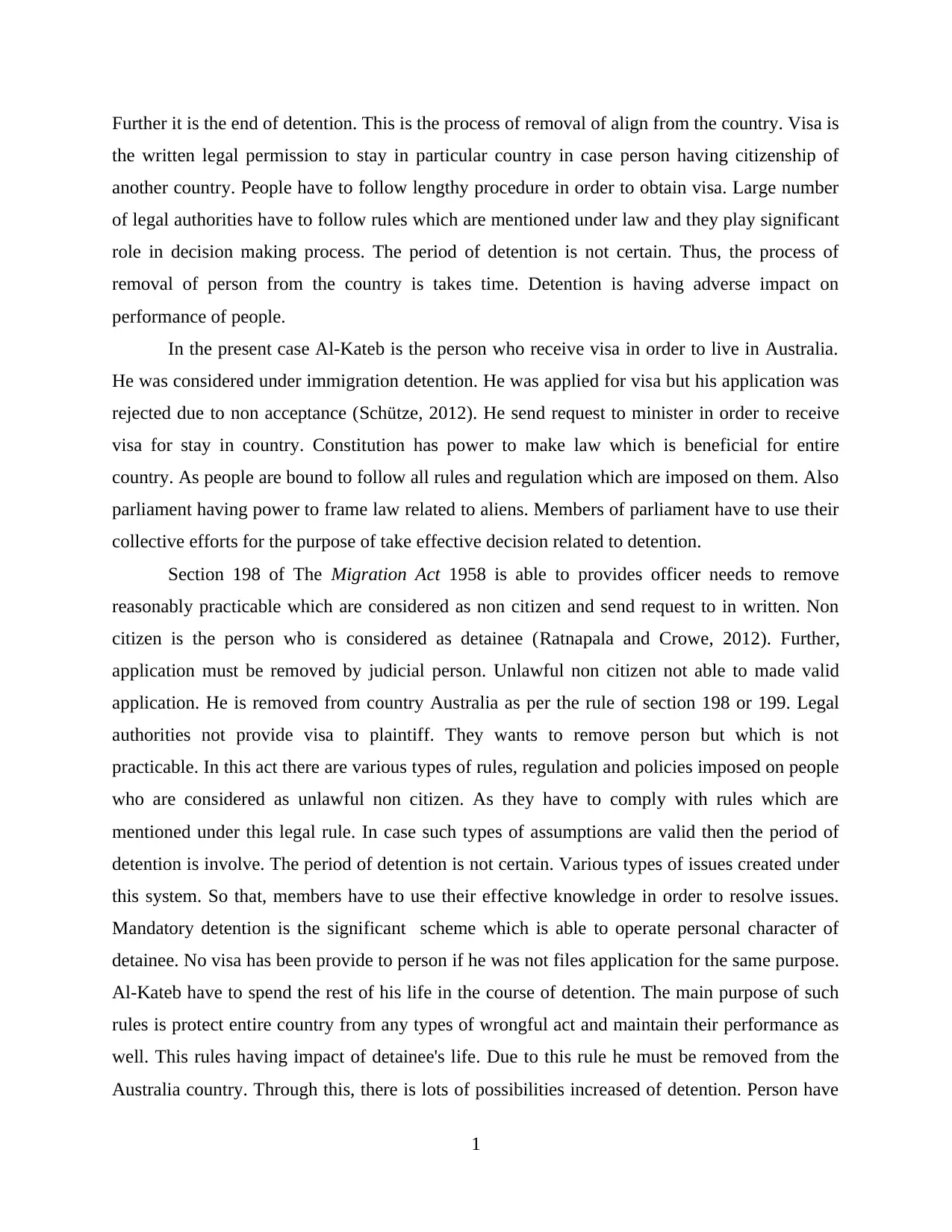
Further it is the end of detention. This is the process of removal of align from the country. Visa is
the written legal permission to stay in particular country in case person having citizenship of
another country. People have to follow lengthy procedure in order to obtain visa. Large number
of legal authorities have to follow rules which are mentioned under law and they play significant
role in decision making process. The period of detention is not certain. Thus, the process of
removal of person from the country is takes time. Detention is having adverse impact on
performance of people.
In the present case Al-Kateb is the person who receive visa in order to live in Australia.
He was considered under immigration detention. He was applied for visa but his application was
rejected due to non acceptance (Schütze, 2012). He send request to minister in order to receive
visa for stay in country. Constitution has power to make law which is beneficial for entire
country. As people are bound to follow all rules and regulation which are imposed on them. Also
parliament having power to frame law related to aliens. Members of parliament have to use their
collective efforts for the purpose of take effective decision related to detention.
Section 198 of The Migration Act 1958 is able to provides officer needs to remove
reasonably practicable which are considered as non citizen and send request to in written. Non
citizen is the person who is considered as detainee (Ratnapala and Crowe, 2012). Further,
application must be removed by judicial person. Unlawful non citizen not able to made valid
application. He is removed from country Australia as per the rule of section 198 or 199. Legal
authorities not provide visa to plaintiff. They wants to remove person but which is not
practicable. In this act there are various types of rules, regulation and policies imposed on people
who are considered as unlawful non citizen. As they have to comply with rules which are
mentioned under this legal rule. In case such types of assumptions are valid then the period of
detention is involve. The period of detention is not certain. Various types of issues created under
this system. So that, members have to use their effective knowledge in order to resolve issues.
Mandatory detention is the significant scheme which is able to operate personal character of
detainee. No visa has been provide to person if he was not files application for the same purpose.
Al-Kateb have to spend the rest of his life in the course of detention. The main purpose of such
rules is protect entire country from any types of wrongful act and maintain their performance as
well. This rules having impact of detainee's life. Due to this rule he must be removed from the
Australia country. Through this, there is lots of possibilities increased of detention. Person have
1
the written legal permission to stay in particular country in case person having citizenship of
another country. People have to follow lengthy procedure in order to obtain visa. Large number
of legal authorities have to follow rules which are mentioned under law and they play significant
role in decision making process. The period of detention is not certain. Thus, the process of
removal of person from the country is takes time. Detention is having adverse impact on
performance of people.
In the present case Al-Kateb is the person who receive visa in order to live in Australia.
He was considered under immigration detention. He was applied for visa but his application was
rejected due to non acceptance (Schütze, 2012). He send request to minister in order to receive
visa for stay in country. Constitution has power to make law which is beneficial for entire
country. As people are bound to follow all rules and regulation which are imposed on them. Also
parliament having power to frame law related to aliens. Members of parliament have to use their
collective efforts for the purpose of take effective decision related to detention.
Section 198 of The Migration Act 1958 is able to provides officer needs to remove
reasonably practicable which are considered as non citizen and send request to in written. Non
citizen is the person who is considered as detainee (Ratnapala and Crowe, 2012). Further,
application must be removed by judicial person. Unlawful non citizen not able to made valid
application. He is removed from country Australia as per the rule of section 198 or 199. Legal
authorities not provide visa to plaintiff. They wants to remove person but which is not
practicable. In this act there are various types of rules, regulation and policies imposed on people
who are considered as unlawful non citizen. As they have to comply with rules which are
mentioned under this legal rule. In case such types of assumptions are valid then the period of
detention is involve. The period of detention is not certain. Various types of issues created under
this system. So that, members have to use their effective knowledge in order to resolve issues.
Mandatory detention is the significant scheme which is able to operate personal character of
detainee. No visa has been provide to person if he was not files application for the same purpose.
Al-Kateb have to spend the rest of his life in the course of detention. The main purpose of such
rules is protect entire country from any types of wrongful act and maintain their performance as
well. This rules having impact of detainee's life. Due to this rule he must be removed from the
Australia country. Through this, there is lots of possibilities increased of detention. Person have
1
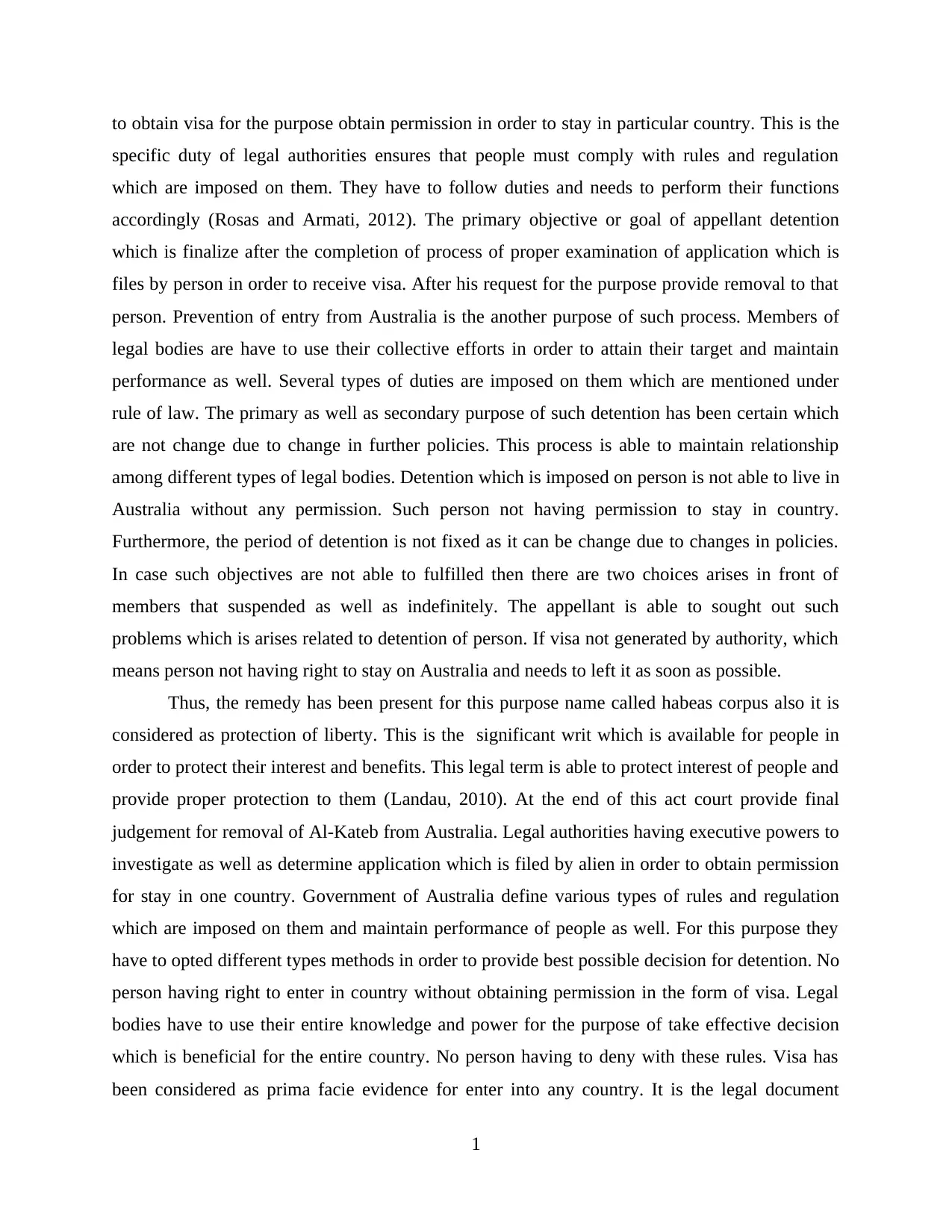
to obtain visa for the purpose obtain permission in order to stay in particular country. This is the
specific duty of legal authorities ensures that people must comply with rules and regulation
which are imposed on them. They have to follow duties and needs to perform their functions
accordingly (Rosas and Armati, 2012). The primary objective or goal of appellant detention
which is finalize after the completion of process of proper examination of application which is
files by person in order to receive visa. After his request for the purpose provide removal to that
person. Prevention of entry from Australia is the another purpose of such process. Members of
legal bodies are have to use their collective efforts in order to attain their target and maintain
performance as well. Several types of duties are imposed on them which are mentioned under
rule of law. The primary as well as secondary purpose of such detention has been certain which
are not change due to change in further policies. This process is able to maintain relationship
among different types of legal bodies. Detention which is imposed on person is not able to live in
Australia without any permission. Such person not having permission to stay in country.
Furthermore, the period of detention is not fixed as it can be change due to changes in policies.
In case such objectives are not able to fulfilled then there are two choices arises in front of
members that suspended as well as indefinitely. The appellant is able to sought out such
problems which is arises related to detention of person. If visa not generated by authority, which
means person not having right to stay on Australia and needs to left it as soon as possible.
Thus, the remedy has been present for this purpose name called habeas corpus also it is
considered as protection of liberty. This is the significant writ which is available for people in
order to protect their interest and benefits. This legal term is able to protect interest of people and
provide proper protection to them (Landau, 2010). At the end of this act court provide final
judgement for removal of Al-Kateb from Australia. Legal authorities having executive powers to
investigate as well as determine application which is filed by alien in order to obtain permission
for stay in one country. Government of Australia define various types of rules and regulation
which are imposed on them and maintain performance of people as well. For this purpose they
have to opted different types methods in order to provide best possible decision for detention. No
person having right to enter in country without obtaining permission in the form of visa. Legal
bodies have to use their entire knowledge and power for the purpose of take effective decision
which is beneficial for the entire country. No person having to deny with these rules. Visa has
been considered as prima facie evidence for enter into any country. It is the legal document
1
specific duty of legal authorities ensures that people must comply with rules and regulation
which are imposed on them. They have to follow duties and needs to perform their functions
accordingly (Rosas and Armati, 2012). The primary objective or goal of appellant detention
which is finalize after the completion of process of proper examination of application which is
files by person in order to receive visa. After his request for the purpose provide removal to that
person. Prevention of entry from Australia is the another purpose of such process. Members of
legal bodies are have to use their collective efforts in order to attain their target and maintain
performance as well. Several types of duties are imposed on them which are mentioned under
rule of law. The primary as well as secondary purpose of such detention has been certain which
are not change due to change in further policies. This process is able to maintain relationship
among different types of legal bodies. Detention which is imposed on person is not able to live in
Australia without any permission. Such person not having permission to stay in country.
Furthermore, the period of detention is not fixed as it can be change due to changes in policies.
In case such objectives are not able to fulfilled then there are two choices arises in front of
members that suspended as well as indefinitely. The appellant is able to sought out such
problems which is arises related to detention of person. If visa not generated by authority, which
means person not having right to stay on Australia and needs to left it as soon as possible.
Thus, the remedy has been present for this purpose name called habeas corpus also it is
considered as protection of liberty. This is the significant writ which is available for people in
order to protect their interest and benefits. This legal term is able to protect interest of people and
provide proper protection to them (Landau, 2010). At the end of this act court provide final
judgement for removal of Al-Kateb from Australia. Legal authorities having executive powers to
investigate as well as determine application which is filed by alien in order to obtain permission
for stay in one country. Government of Australia define various types of rules and regulation
which are imposed on them and maintain performance of people as well. For this purpose they
have to opted different types methods in order to provide best possible decision for detention. No
person having right to enter in country without obtaining permission in the form of visa. Legal
bodies have to use their entire knowledge and power for the purpose of take effective decision
which is beneficial for the entire country. No person having to deny with these rules. Visa has
been considered as prima facie evidence for enter into any country. It is the legal document
1
⊘ This is a preview!⊘
Do you want full access?
Subscribe today to unlock all pages.

Trusted by 1+ million students worldwide
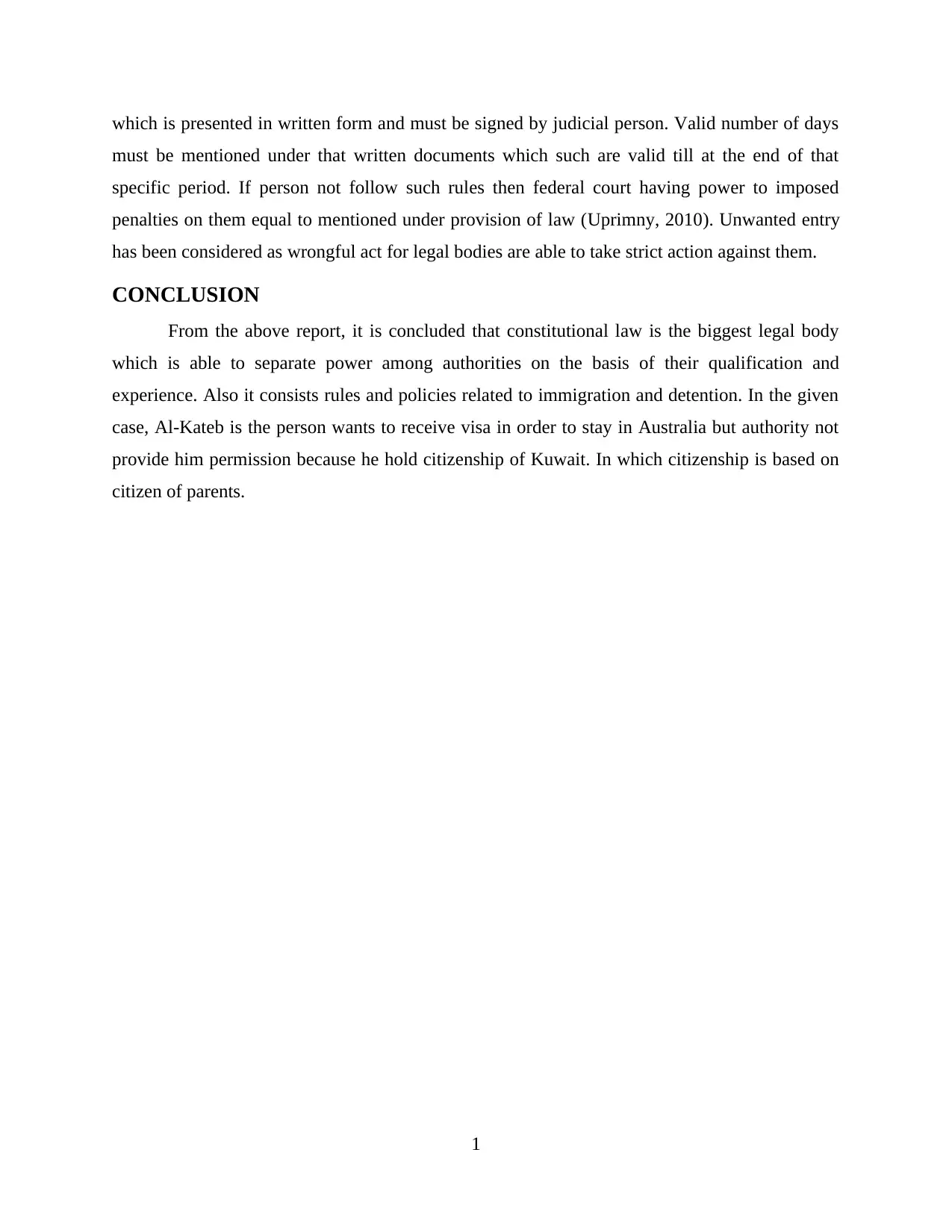
which is presented in written form and must be signed by judicial person. Valid number of days
must be mentioned under that written documents which such are valid till at the end of that
specific period. If person not follow such rules then federal court having power to imposed
penalties on them equal to mentioned under provision of law (Uprimny, 2010). Unwanted entry
has been considered as wrongful act for legal bodies are able to take strict action against them.
CONCLUSION
From the above report, it is concluded that constitutional law is the biggest legal body
which is able to separate power among authorities on the basis of their qualification and
experience. Also it consists rules and policies related to immigration and detention. In the given
case, Al-Kateb is the person wants to receive visa in order to stay in Australia but authority not
provide him permission because he hold citizenship of Kuwait. In which citizenship is based on
citizen of parents.
1
must be mentioned under that written documents which such are valid till at the end of that
specific period. If person not follow such rules then federal court having power to imposed
penalties on them equal to mentioned under provision of law (Uprimny, 2010). Unwanted entry
has been considered as wrongful act for legal bodies are able to take strict action against them.
CONCLUSION
From the above report, it is concluded that constitutional law is the biggest legal body
which is able to separate power among authorities on the basis of their qualification and
experience. Also it consists rules and policies related to immigration and detention. In the given
case, Al-Kateb is the person wants to receive visa in order to stay in Australia but authority not
provide him permission because he hold citizenship of Kuwait. In which citizenship is based on
citizen of parents.
1
Paraphrase This Document
Need a fresh take? Get an instant paraphrase of this document with our AI Paraphraser
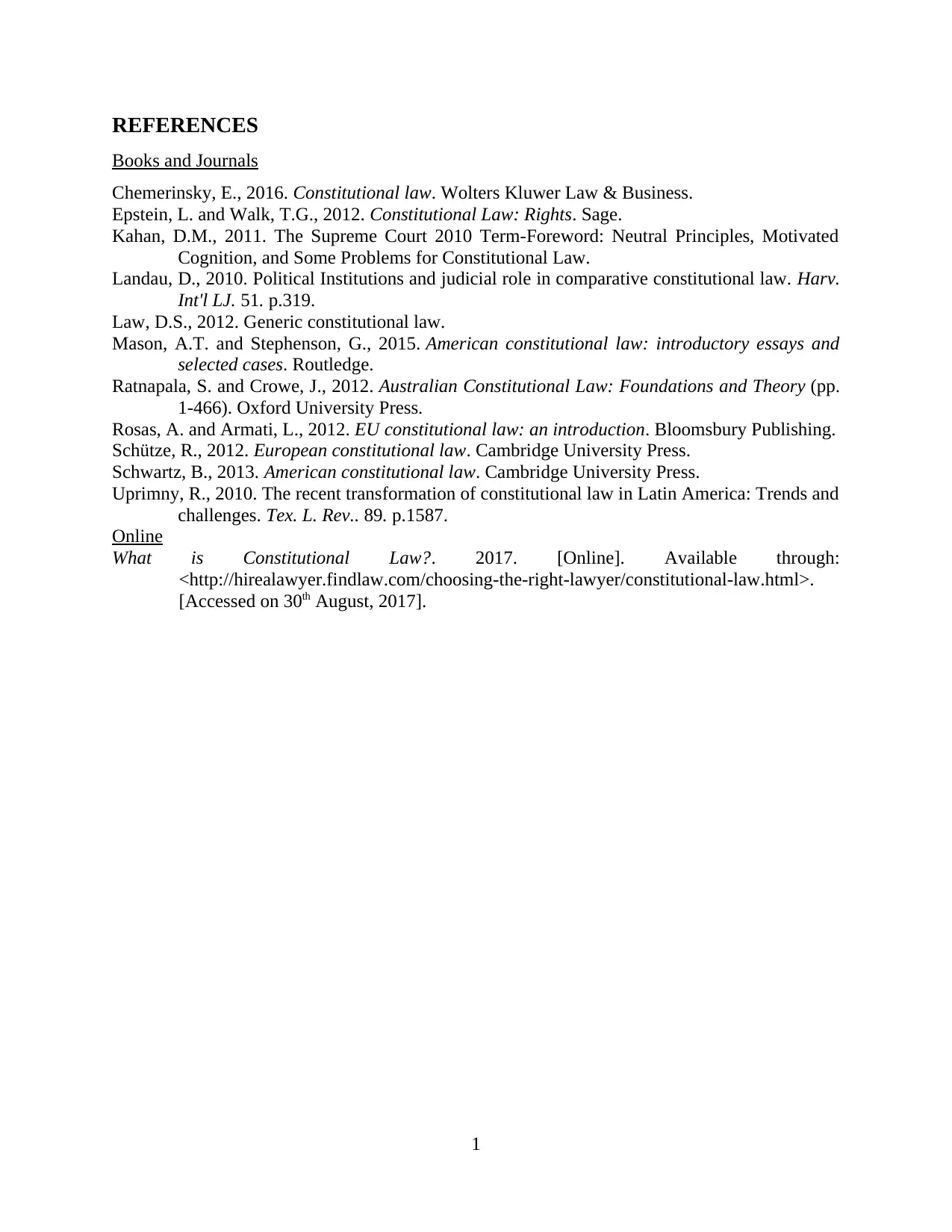
REFERENCES
Books and Journals
Chemerinsky, E., 2016. Constitutional law. Wolters Kluwer Law & Business.
Epstein, L. and Walk, T.G., 2012. Constitutional Law: Rights. Sage.
Kahan, D.M., 2011. The Supreme Court 2010 Term-Foreword: Neutral Principles, Motivated
Cognition, and Some Problems for Constitutional Law.
Landau, D., 2010. Political Institutions and judicial role in comparative constitutional law. Harv.
Int'l LJ. 51. p.319.
Law, D.S., 2012. Generic constitutional law.
Mason, A.T. and Stephenson, G., 2015. American constitutional law: introductory essays and
selected cases. Routledge.
Ratnapala, S. and Crowe, J., 2012. Australian Constitutional Law: Foundations and Theory (pp.
1-466). Oxford University Press.
Rosas, A. and Armati, L., 2012. EU constitutional law: an introduction. Bloomsbury Publishing.
Schütze, R., 2012. European constitutional law. Cambridge University Press.
Schwartz, B., 2013. American constitutional law. Cambridge University Press.
Uprimny, R., 2010. The recent transformation of constitutional law in Latin America: Trends and
challenges. Tex. L. Rev.. 89. p.1587.
Online
What is Constitutional Law?. 2017. [Online]. Available through:
<http://hirealawyer.findlaw.com/choosing-the-right-lawyer/constitutional-law.html>.
[Accessed on 30th August, 2017].
1
Books and Journals
Chemerinsky, E., 2016. Constitutional law. Wolters Kluwer Law & Business.
Epstein, L. and Walk, T.G., 2012. Constitutional Law: Rights. Sage.
Kahan, D.M., 2011. The Supreme Court 2010 Term-Foreword: Neutral Principles, Motivated
Cognition, and Some Problems for Constitutional Law.
Landau, D., 2010. Political Institutions and judicial role in comparative constitutional law. Harv.
Int'l LJ. 51. p.319.
Law, D.S., 2012. Generic constitutional law.
Mason, A.T. and Stephenson, G., 2015. American constitutional law: introductory essays and
selected cases. Routledge.
Ratnapala, S. and Crowe, J., 2012. Australian Constitutional Law: Foundations and Theory (pp.
1-466). Oxford University Press.
Rosas, A. and Armati, L., 2012. EU constitutional law: an introduction. Bloomsbury Publishing.
Schütze, R., 2012. European constitutional law. Cambridge University Press.
Schwartz, B., 2013. American constitutional law. Cambridge University Press.
Uprimny, R., 2010. The recent transformation of constitutional law in Latin America: Trends and
challenges. Tex. L. Rev.. 89. p.1587.
Online
What is Constitutional Law?. 2017. [Online]. Available through:
<http://hirealawyer.findlaw.com/choosing-the-right-lawyer/constitutional-law.html>.
[Accessed on 30th August, 2017].
1
1 out of 8
Related Documents
Your All-in-One AI-Powered Toolkit for Academic Success.
+13062052269
info@desklib.com
Available 24*7 on WhatsApp / Email
![[object Object]](/_next/static/media/star-bottom.7253800d.svg)
Unlock your academic potential
Copyright © 2020–2026 A2Z Services. All Rights Reserved. Developed and managed by ZUCOL.





